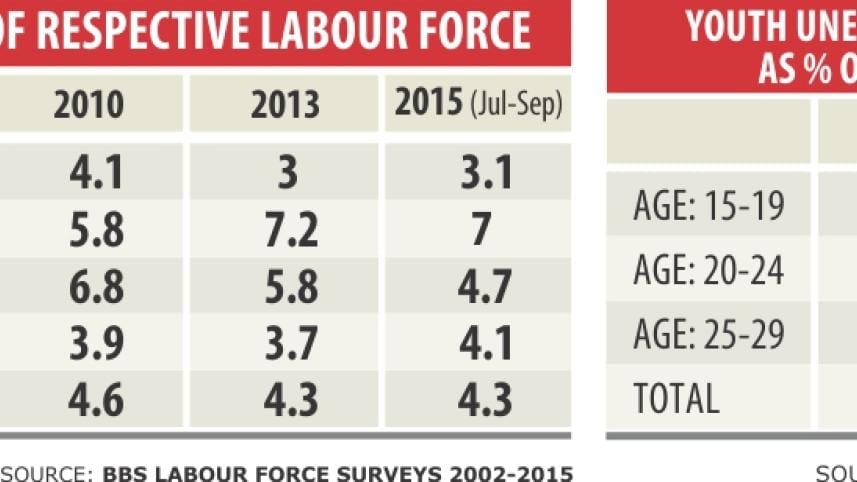New jobs to stay elusive

The parameters of employment generation show it would be a tough task for the government in the next fiscal year to create adequate jobs, which is a key element for higher economic growth.
A slowdown in private investment, checking declining trend in remittance and transforming potential workforce into skilled manpower will be major challenges for the government.
In this situation, experts say, the government should formulate a proper plan for the future employment generation and figure out how it will be done and in which sector.
The finance minister identified inadequate employment generation as a major concern in his budget speech yesterday.
“Answer to this problem is ensuring higher growth and in tandem, ascertaining fair distribution of income growth to establish an equitable society. This is, by no means, an easy task.”
The minister also stressed employment generation growth in various sectors to attain the targeted 7.2 percent GDP growth in the coming fiscal year.
But he did not elaborate or mention any specific plan how to accelerate sector-wise employment generation, especially focusing on the youth group.
The unemployment rate stood at 4.3 percent at the end of September last year, according to Bangladesh Bureau of Statistics (BBS) Labour Force Survey.
Rushidan Islam Rahman, research director of Bangladesh Institute of Development Studies, said the budget should give a clearer picture of future employment growth. It should specify the sectors and how school education and skills will be contributing to employment and productivity.
The Centre for Policy Dialogue last week said Bangladesh had failed to create adequate jobs despite higher economic growth in recent years.
The independent think-tank said the economy is estimated to register about 7 percent growth in the outgoing fiscal year, largely supported by the pay hike of public employees, after maintaining more than 6 percent growth in the past decade.
The economic growth, particularly since 2013, could not result in enough job creation, it said, adding that the number of jobs rose impressively during 2002-2013, by 13.6 lakh per year.
But the number appears to have fallen to only three lakh a year since 2013, it said, referring to the BBS survey.
The finance minister, however, in his speech said about 47 lakh men and women were added to total labour force in 2010-15. Around 98 percent of it could secure employment.
Mustafizur Rahman, executive director of the CPD, said skilled human resources are necessary “if we want to transform our sector-driven economy into efficiency- and productivity-driven economy.”
Referring to the National Human Resource Development Fund, he said the government should implement it on an urgent basis.
The finance minister in his last year's budget speech announced a Tk 100 crore fund for skilled human resource development that is yet to be used. The minister, however, in this year's speech said the fund will be utilised from the next fiscal year.
“It is unfortunate that we have lost one year. We could have enhanced our productivity by using the skilled labour force during the time,” said Mustafizur Rahman.
Zahid Hossain, lead economist at the World Bank, said the record shows the budgetary measures were not enough to create direct employment in the public sector or to indirectly contribute to employment generation in the private sector.
“Budgetary measures have been very deficient in encouraging the improvement of operational performance in the state-owned enterprises. Implementation performance of employment creating public investment projects has been poor as well.”
He said the measures have not only failed to create employment directly but also failed to induce employment creation in the private sector by easing infrastructure and energy bottlenecks. The recent budgets have not been bold enough in carrying out policy and institutional reforms that could have reduced the cost of doing business in the private sector.
“Budgetary measures to accelerate the implementation of transfor-mational infrastructure and energy projects, better management of public workfare programmes in social protection and policy reforms to rejuvenate private investments can boost employment generation both directly and indirectly.”
He said high priority needs to be given to completing the ongoing large public investment projects in the energy and physical communication sectors.
Better management of public-sector social protection programmes, such as employment generation programmes for the poor and Food for Work, particularly by reducing leakages, can create more employment without expanding budgetary allocation to these programmes, he added.
“At the same time, policy and institutional reforms in the areas of taxation, contract enforcement, business dispute resolution, property registration, bankruptcy resolution, processes in getting utility connections and so on can contribute to creation of more and better jobs in the private sector.”
According to BBS, private sector investment came down to 21.78 percent in this fiscal year, from 22.07 percent in the last fiscal year.
The inward remittances fell 7.75 percent year-on-year to $1.19 billion in April as low oil prices continue to erode the incomes of the countries that host most of the Bangladeshi migrant workers.
In the first 10 months of this fiscal year, $12.23 billion was received as remittance, down 2.39 percent year-on-year, according to the central bank data.
 For all latest news, follow The Daily Star's Google News channel.
For all latest news, follow The Daily Star's Google News channel.
Comments